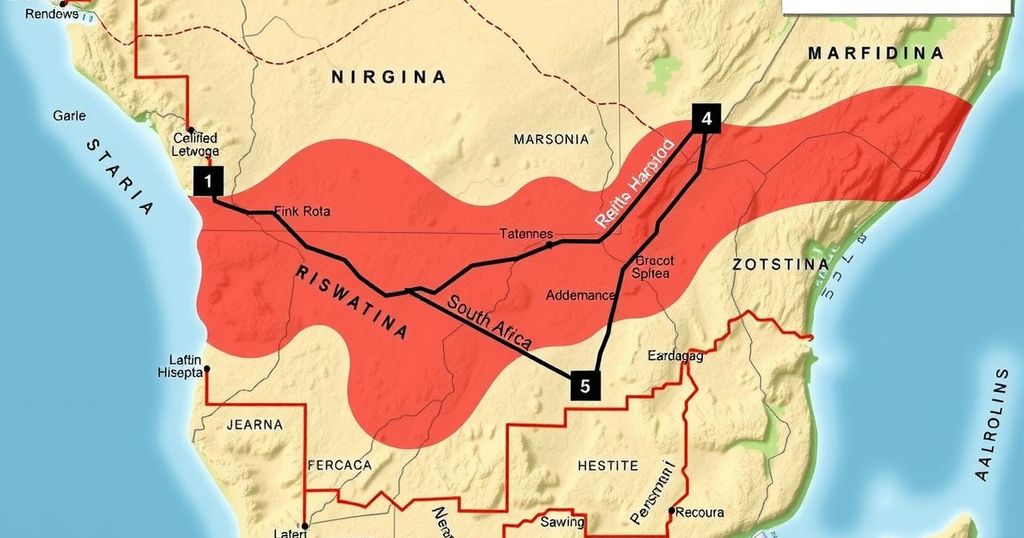Following political unrest in Mozambique, trade and travel are being redirected from South Africa’s Leebombo Border Post to Eswatini’s Mananga Border Post. Experts emphasize the urgency of regional dialogue and intervention to manage the ongoing crisis, especially in light of a contested election and escalating violence. International calls for cooperation present a potential path towards restoring stability.
Amidst a political crisis triggered by a contentious national election and violent protests in Mozambique, the dynamics of trade and travel across its southern border with South Africa have become increasingly tenuous. The escalating violence has necessitated the rerouting of trade and travel operations from South Africa’s Leebombo Border Post to Eswatini’s Mananga Border Post. This change has rendered Mananga a critical alternative for individuals attempting to cross from Mozambique.
Michael Masiapato, the commissioner of South Africa’s Border Management Authority, confirmed to VOA that while authorities are actively addressing the situation, the challenges remain formidable. He noted the difficulty in providing comprehensive security coverage despite the deployment of military and police forces along the corridor between Maputo, the capital of Mozambique, and the border area. “Even … when they deploy the military and when they deploy police officers on the corridor [between the capital, Maputo, and the border], it is not able to cover each and every area,” he explained. Masiapato characterized the protests as “very much sporadic” and “very much widespread.”
The unrest surged following the election victory of presidential candidate Daniel Chapo, which has been marred by accusations of fraud, leading to widespread turmoil and resulting in numerous fatalities during protests. Analysts have raised alarms regarding the potential repercussions for regional security, suggesting that the continuation of political violence may foster an environment conducive to escalating crime and weapon proliferation.
Solomon Mondlane, a political analyst in Mozambique, expressed cautious optimism regarding international diplomatic efforts aimed at resolving the crisis. “The situation is volatile,” Mondlane stated. “The good news is we’re hearing more calls from different countries — from South Africa, from other European countries — calling for more dialogue. South Africa has come out to say they are willing to facilitate a dialogue.” He emphasized that while the South African government has historically supported the ruling Frelimo party, it is now open to facilitating discussions between the opposition and the government.
Levy Ndou, a political analyst and lecturer at Tshwane University of Technology, echoed this sentiment, identifying ongoing dialogues between regional stakeholders and the Mozambican government as a hopeful sign. He indicated that should the situation deteriorate further, intervention by the Southern African Development Community (SADC) may become necessary to restore peace and facilitate economic activity. Ndou stated, “Of course, if the situation gets out of hand, it will therefore require the intervention of SADC in order to ensure that there is peace, there is stability and, indeed, there is economic activity that is going on.”
Emerging as a pivotal figure, Zimbabwean President Emmerson Mnangagwa, currently chairing the SADC, pledged the regional bloc’s readiness to provide support to Mozambique during this tumultuous period.
As Mozambique navigates this precarious phase marked by political instability and violence, the implications for regional trade, security, and cooperation remain significant. The responses from South Africa and other nations within the SADC could play a crucial role in shaping the outcome of the ongoing crisis.
The political landscape in Mozambique has been destabilized by recent electoral disputes, particularly following the controversial win of presidential candidate Daniel Chapo amidst widespread allegations of election fraud. This situation has ignited protests and violence, which have posed numerous challenges to governance and public safety. The rerouting of trade to Eswatini is symptomatic of the larger issues prevailing in the region, including the need for stability and economic adherence to secure trade routes. The involvement of regional powers, including South Africa and the SADC, is increasingly demanded to mediate and foster dialogue between conflicting parties in Mozambique to prevent further escalation.
In conclusion, the current political turmoil in Mozambique has led to serious repercussions for trade and travel, compelling authorities to adapt by redirecting activities to Eswatini. As violence persists following the disputed election results, the international community, led by South Africa and SADC, must remain engaged in facilitating dialogue and seeking solutions to stabilize the region. The actions taken by regional leaders may ultimately determine the trajectory of peace and security in Mozambique and its neighboring countries.
Original Source: www.voanews.com






